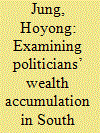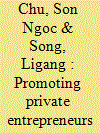|
|
|
Sort Order |
|
|
|
Items / Page
|
|
|
|
|
|
|
| Srl | Item |
| 1 |
ID:
172650


|
|
|
|
|
| Summary/Abstract |
One of the public’s popular beliefs about politics is that politicians engage in rent-seeking behaviors, such as accumulating property, using their political power. By applying a regression discontinuity design, this study examines whether members of the National Assembly of South Korea gained assets during three elective terms (2004–2008, 2008–2012, and 2012–2016). The results contradict the public’s claim. In general, there is minimal evidence that election winners accumulate more assets than runners-up. And observing the winners’ premium for newly elected politicians in the 2012–2016 term, I find that it is related to a political support fund, which is a legitimate channel for politicians’ funding. The results suggest that an information disclosure policy can play a pivotal role in restricting politicians’ rent-seeking behaviors.
|
|
|
|
|
|
|
|
|
|
|
|
|
|
|
|
| 2 |
ID:
120116


|
|
|
|
|
| Publication |
2013.
|
| Summary/Abstract |
The research on entrepreneurship as an economic phenomenon often assumes its desirability as a driver of economic development and growth. However, entrepreneurial talent can be allocated among productive, unproductive and destructive activities. This allocation has important implications in the developing world, particularly for countries hosting conflict or recovering from conflict. The allocation of entrepreneurship is theorized as driven by institutions. Although the trade-off between productive and unproductive entrepreneurship has been examined, destructive entrepreneurship has been largely ignored. We build from existing theory and define destructive entrepreneurship as wealth destroying. We propose three assumptions to develop a model of destructive entrepreneurship that presents the mechanisms through which entrepreneurial talent behaves in this manner. We present four key propositions on the nature and behavior of destructive entrepreneurship. We conclude by identifying research agendas and policy streams, with a focus on relevance to conflict and postconflict recovery.
|
|
|
|
|
|
|
|
|
|
|
|
|
|
|
|
| 3 |
ID:
137598


|
|
|
|
|
| Summary/Abstract |
After more than three decades of rapid growth, China's economy is going through an important turning point, where structural imbalances in both supply and demand sides must be addressed for a more moderate and sustainable growth path. By focusing on the structural changes to its ownership, a central element in China's economic transformation under market reform, the present paper highlights the importance of private entrepreneurship in deepening market reform and, thereby, in driving economic growth in a more efficient and sustainable way. Based on a perspective of resource allocation and a conceptual framework of entrepreneurship, the paper elaborates on the evolution of the private sector and its performance in the context of ownership reform, making comparisons with the performance of the state sector. The analysis suggests that there is further room for more productive use of economic resources, especially capital, land and natural resources, by increasing the participation of private entrepreneurs in industries with high entry barriers in favor of state-owned enterprises. Moreover, more competitive and equal access to productive resources through reform is needed to promote more productive entrepreneurship and to reduce rent-seeking activities.
|
|
|
|
|
|
|
|
|
|
|
|
|
|
|
|
| 4 |
ID:
137233


|
|
|
|
|
| Summary/Abstract |
Unlike the eponymous hero of the Kyrgyz epic, Manas, who united the Kyrgyz people, the American air base situated at Kyrgyzstan's Manas International Airport became a source of fracture in Kyrgyz politics after its establishment in late 2001 to support the US-led war in Afghanistan. Whilst international attention focuses on the geopolitics of a so-called New Great Game over basing rights in Central Asia, a more significant political and economic struggle concerning the Manas Air Base is related to its fuel supplies. The air base became a source of rent for the ruling elites and an object of controversy between the government and opposition in two successful uprisings, which removed presidents Askar Akayev and Kurmanbek Bakiyev from power (in 2005 and 2010, respectively). The air base's secret fuel contractors, with their unknown beneficiaries, offshore registration and low visibility, built close links to the regimes of the two ousted presidents. The lucrative and illicit contracts and subcontracts were purportedly used by both presidents and their entourages for personal enrichment and to strengthen their regimes but were ultimately a factor in their downfall. Drawing on the results of recent congressional and non-governmental investigations and interviews with representatives of the fuel-supply companies and members of the former regime, this work assesses the role of the US Manas Air Base in regime security and rent-seeking schemes during the Akayev and Bakiyev tenures. Thus, this article will contribute to the growing literature on rent-seeking in Eurasia's hybrid regimes and the external dimensions of regime security.
|
|
|
|
|
|
|
|
|
|
|
|
|
|
|
|
| 5 |
ID:
115117


|
|
|
|
|
| Publication |
2012.
|
| Summary/Abstract |
Carbon dioxide emissions correspond to fossil resource use. When considering this supply side of climate protection, crucial questions come to fore. It seems likely that owners of fossil resources would object to emission reductions. Moreover, policy instruments such as taxes may not be effective at all: it seems individually rational to leave no fossil resources unused. In this context, it can be expected that economic sectors will react strategically to climate policy, aiming at a re-distribution of rents.
To address these questions, we investigate the effectiveness, efficiency, and resource rents for energy taxes, resource taxes, and quantity rationing of emissions. The analysis is based on a game theoretic growth model with explicit factor markets and policy instruments. Market equilibrium depends on a government that acts as a Stackelberg leader with a climate protection goal. We find that resource taxes and quantity rationing achieve this objective efficiently, energy taxation is only second-best. The use of quantity rationing to achieve climate protection generates substantial rents for resource owners.
|
|
|
|
|
|
|
|
|
|
|
|
|
|
|
|
| 6 |
ID:
142027


|
|
|
|
|
| Summary/Abstract |
This paper examines the ongoing promotion of infrastructure and water privatization in Malaysia despite the failure to increase capital investment and improve efficiency. It locates privatization within the process of capital accumulation, with rents and rent-seeking as an integral part of this. In this context, water privatization provides opportunities for the creation of entrepreneurs through the allocation of rents in the form of water-related contracts. The paper provides preliminary evidence, drawing from privatized water and sewerage projects in the state of Selangor to illustrate how this offers rents for both bumiputera (Malay) and non-bumiputera entrepreneurs. Rent-seeking is driven by changes in social formations and specifically the emergence of a Malay middle class that needed to be politically accommodated.
|
|
|
|
|
|
|
|
|
|
|
|
|
|
|
|
|
|
|
|
|